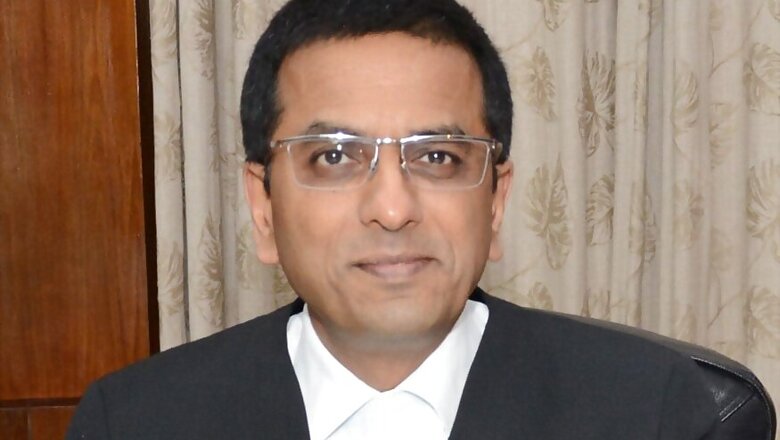
views
A Supreme Court judge seems resolute to chart his own course — speaking his mind freely, exuding judicial independence to the hilt.
What worries Justice DY Chandrachud, perhaps the least, is the number of years he has spent in the top court as a judge and whether he speaks for the majority or the minority on the bench.
He minces no words when he talks, and apparently does not get bogged down by the fact that he is at number 18 of the 25 judges in the apex court.
Justice Chandrachud has spent most of his time in the apex court sitting on benches presided by the Chief Justices of India.
Monday was the first time when Justice Chandrachud, sitting on a bench with CJI Dipak Misra, was hearing a plea for recall of the November 2016 order on the compulsory playing of the National Anthem in movie halls. The order was passed by a different bench which was also led by Justice Misra.
Thirty minutes into the hearing, Justice Chandrachud expressed his strong disagreement with the 2016 order even as Justice Misra sat to his right on the three-judge bench, presiding it.
In the next 10 minutes, the judge punctured holes in the Attorney General’s arguments regarding the necessity of the court to pass such an order and said in clear terms that people don’t need to wear patriotism on their sleeves all the time.
Critical of any kind of moral policing, Justice Chandrachud made his views unequivocal that not singing the National Anthem in cinema halls will not make him an anti-national and that it was kind of “absurd” to keep playing the anthem at international events when half the crowd does not even understand what is being sung.
He questioned the government why they have not issued appropriate notifications when they felt so strongly about the issue. All this while, CJI Misra witnessed the dialogue between Justice Chandrachud and the AG with equanimity as the original order was being questioned by a judge on the same bench.
And this was not an exception. Justice Chandrachud has always stood his ground when it comes to his understanding of the legal issues before him and commenting upon it.
On Monday itself, Justice Chandrachud issued another order in which he dissented with CJI Misra and Justice Khanwilkar, and cautioned the top court against lagging behind on embracing technology to facilitate dispensation of justice.
By a 2:1 majority, the bench overruled a two-judge bench decision that wanted family courts to conduct matrimonial proceedings through video-conferencing.
Disagreeing with the majority opinion, Justice Chandrachud sounded an alarm bell for the judiciary if it still holds reservation against the use of technology.
“Should this court even attempt to put a lid on the inexorable movement towards incorporating technology? If we do so, we risk ourselves being left behind as an anachronism in a digital age,” he maintained.
While the majority verdict negated a direction to use video conferencing, Justice Chandrachud noted “it must be acknowledged that a whole-hearted acceptance of technology is necessary for courts to meet societal demands for efficient and timely justice.”
Not just this, Justice Chandrachud also highlighted the need to respect the wisdom of high courts in matters of administering how local courts should function and why they should have the liberty to tailor the proceedings to meet the needs of the society.
He reminded his brethren in the Supreme Court about the “vibrant federal structure” in the judiciary and the need to respect high courts.
“Voices from within the judiciary in a federal structure should merit close listening by the Supreme Court,” said Justice Chandrachud.
Supporting the previous judgment on the use of video-conferencing, Justice Chandrachud went on to state that there was, in fact, no need to overrule it because the other benches in the apex court misconstrued it.
The judgment he authored in the right to privacy case is another instance to demonstrate how firm Justice Chandrachud is in his views and judicial acumen.
He created a history of sorts when he overruled a judgment of his father, Justice YV Chandrachud, who had held in 1975 that right to liberty is suspended during Emergency. This judgment was described as “seriously flawed” by the son.
Justice Chandrachud’s 17-month stint has reaffirmed the position that all the judges in the Supreme Court have equal judicial powers and that the CJI is first among equals only in terms of his administrative authority.
It also underscores the importance of having best of judicial minds at the highest forum who have the acumen and dexterity to convince even the senior judges on the bench in deciding matters of law and Constitution.
Justice Chandrachud seems to have broken a glass ceiling and the judiciary definitely needs more such voices to make sure the majesty of the law is upheld without exception by the men on the bench.




















Comments
0 comment